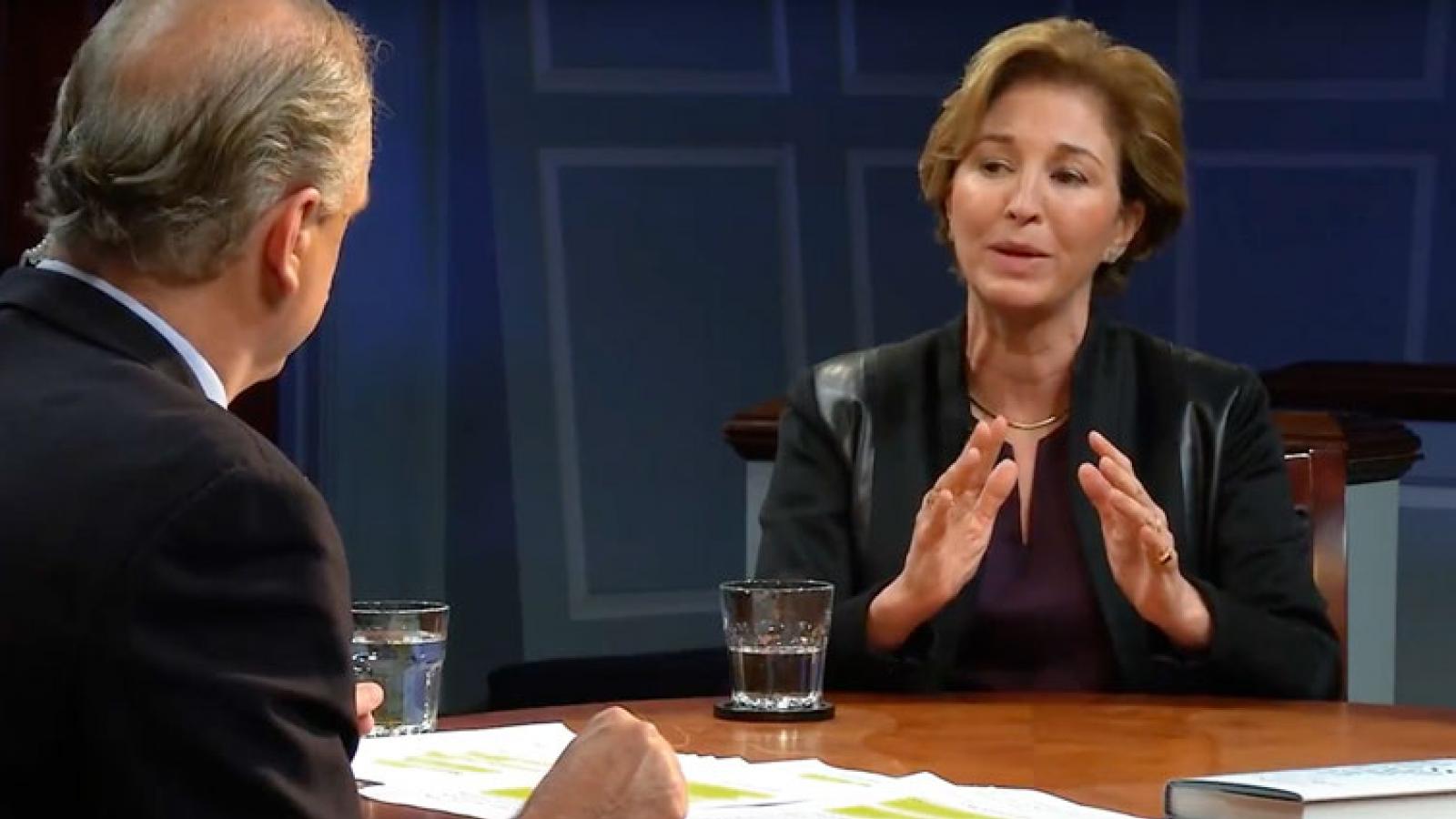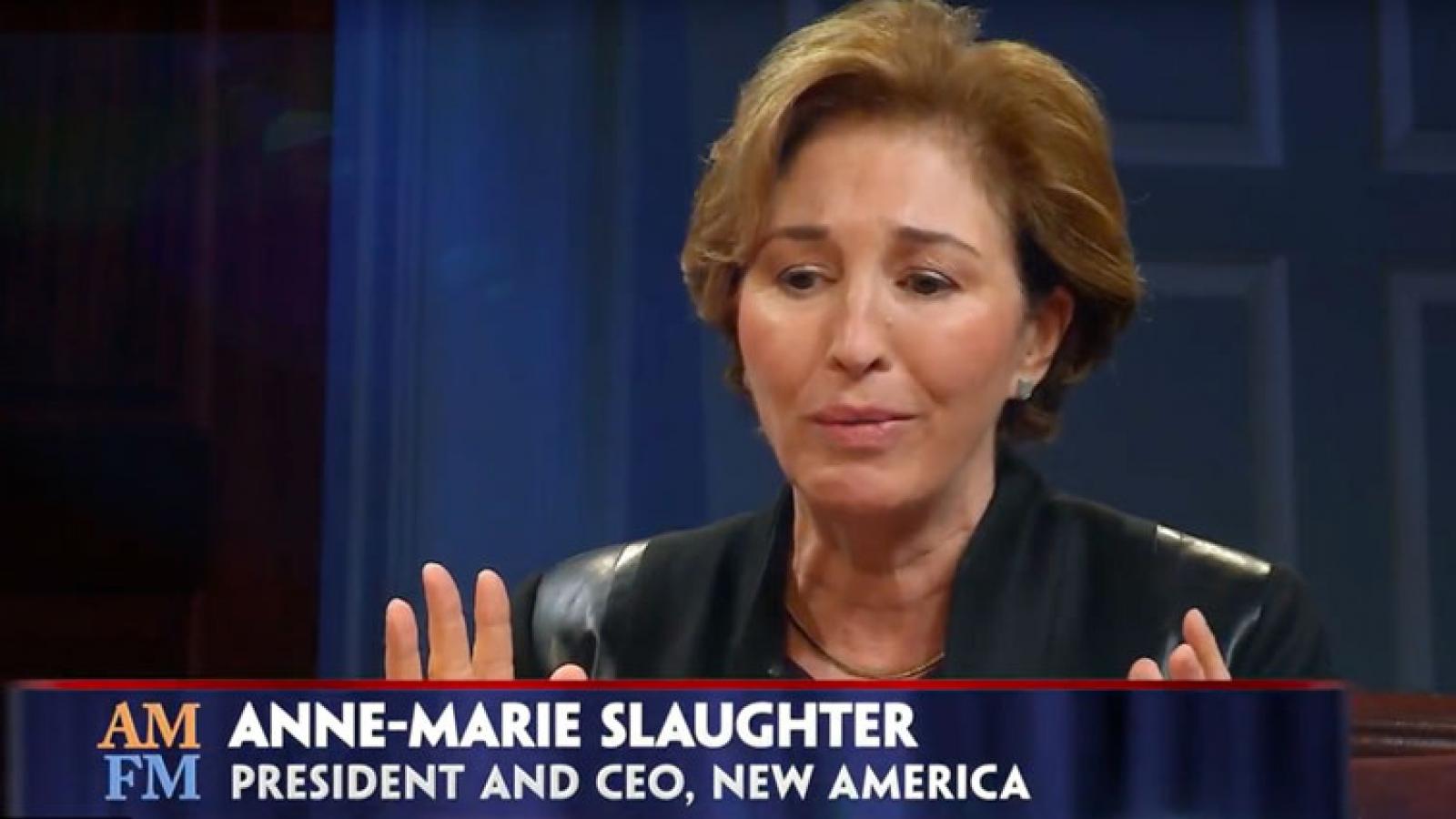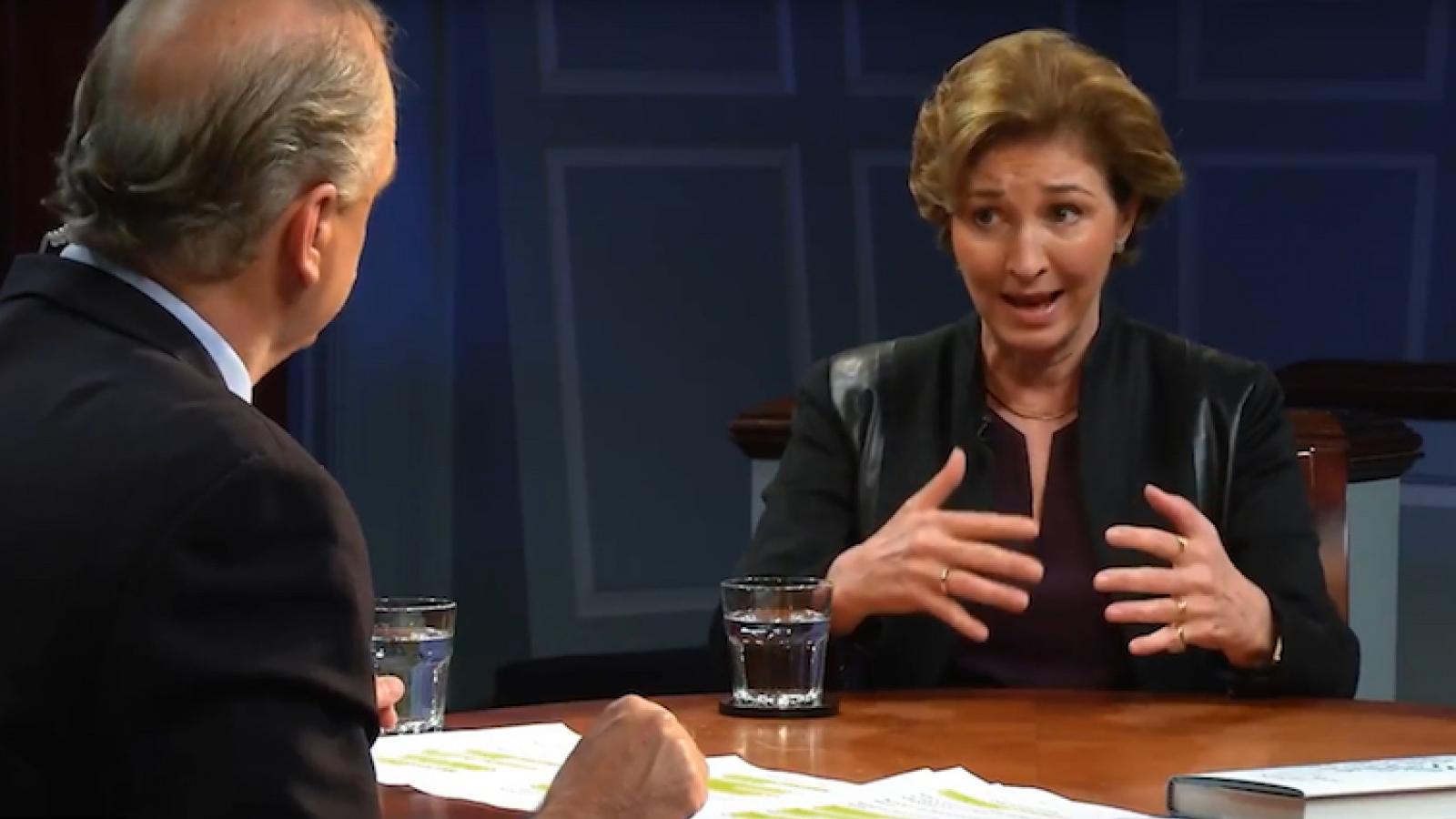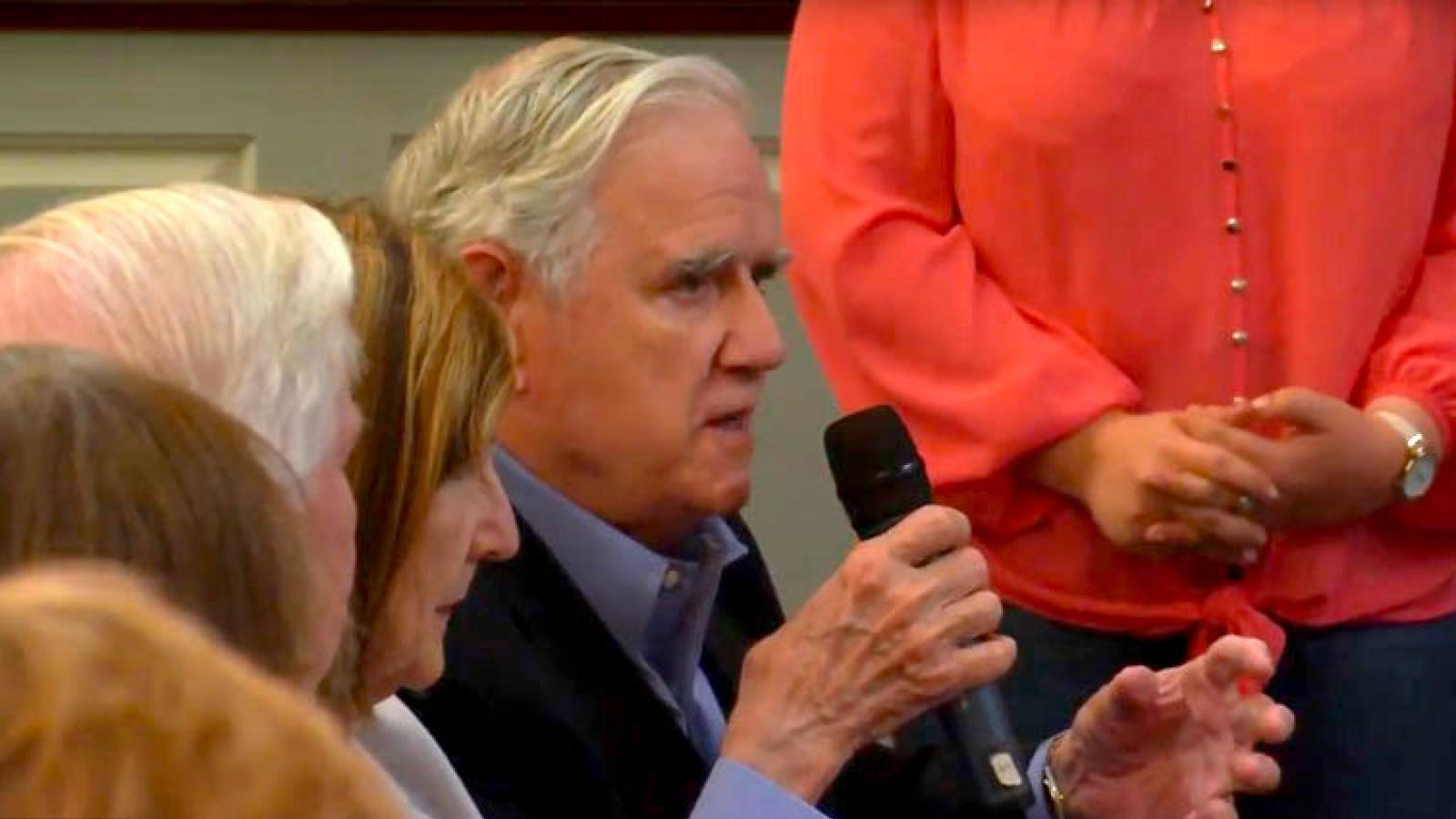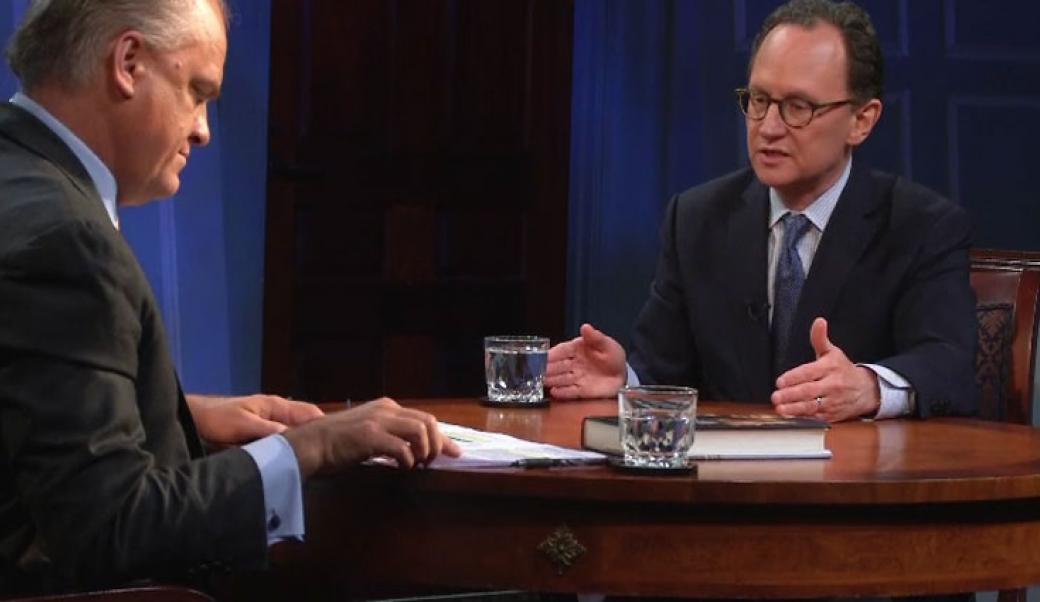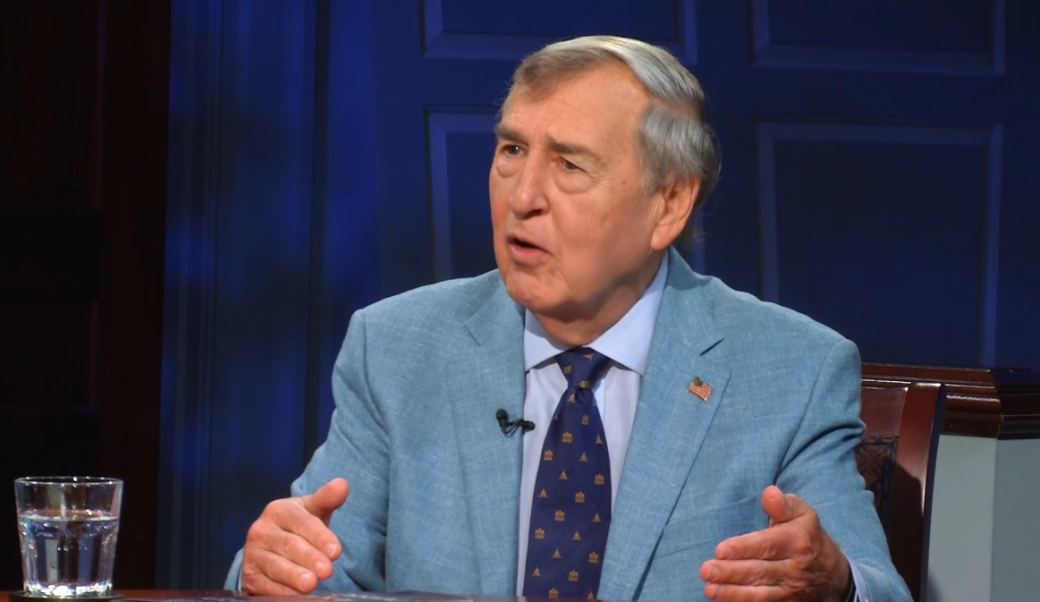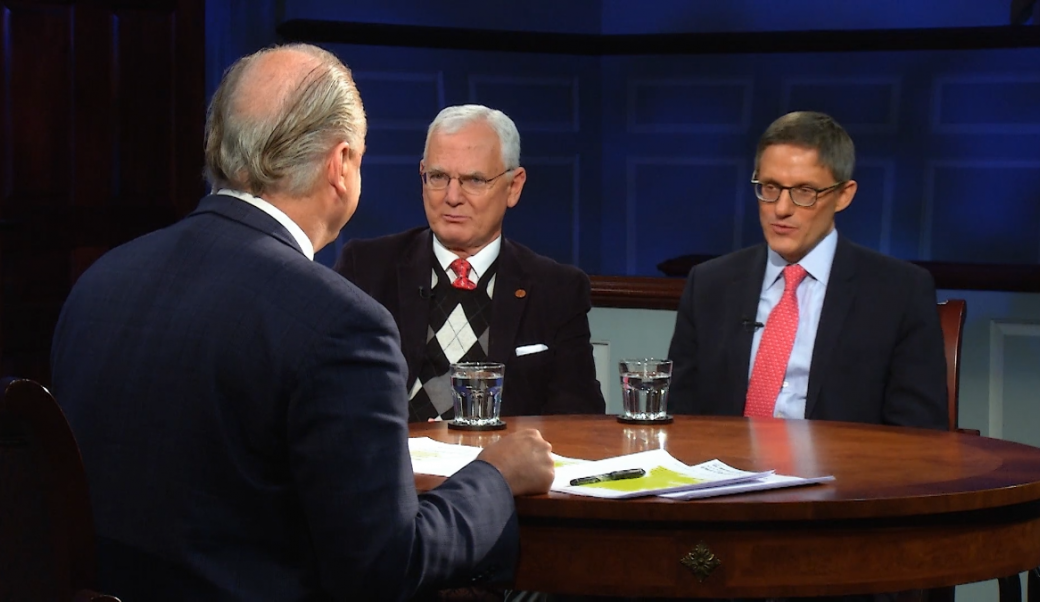About this episode
May 07, 2017
Anne-Marie Slaughter
Shortly after President Trump ordered a missile attack in Syria, he received some surprising applause from our American Forum guest this week, Anne-Marie Slaughter, a former director of policy planning at the State Department during the Obama administration and current head of the Washington think-tank New America. The author of "Unfinished Business," about the work-life balance issues facing professional women, Slaughter talks with host Doug Blackmon about the state of US foreign policy, when it's a bad idea to take military force off the table, and whether misogyny played a role in the defeat of Hillary Clinton in the 2016 presidential election.
Foreign Affairs
Diplomacy in the age of Trump
Transcript
Douglas Blackmon in Studio: This week on American Forum, a deep dive into foreign policy issues…especially Syria. Our guest, Anne-Marie Slaughter.
MAIN TITLES/MX
4:49 Douglas Blackmon: Welcome back to American Forum. I’m Doug Blackmon. From the collapse of the healthcare repeal effort to a sudden Tomahawk missile strike in Syria, President Donald Trump and his administration have been zigzagging from one crisis to another, often taking fire from all directions. But shortly after the missile attack in Syria, the President got some surprising applause from our guest this week, Anne-Marie Slaughter, a director of policy planning at the State Department during the Obama administration and one of the most prominent public intellectuals in the country.
QUESTION: Can President Trump turn the corner in Syria?
Via Twitter, she said, “Donald Trump has done the right thing on Syria, finally.” Anne-Marie Slaughter has made a career out of counter-intuitive analysis of Washington politics, foreign policy, and American society, and she has never hesitated to share her views. Her book Unfinished Business sparked an enormous discussion on the work-life balance issues facing professional women. Her piece in The Atlantic Magazine that led to the book is the most-read article in the history of that publication. Today, she heads a Washington think-tank called New America, which dedicates itself to advancing American progress with big ideas in the digital age. Her newest book, The Chessboard and the Web, argues for a whole new approach to international relationships and politics. Anne-Marie Slaughter, thanks for being here.
Anne-Marie Slaughter: My pleasure.
2:05 Blackmon: Let’s go to that tweet that you sent out praising President Trump, at least in those 140 characters. Some might have read that as something of a rebuke to your old boss, President Obama. Is that what that meant?
Slaughter: It did—it was. President Obama would not have been in the least bit surprised. I left government in 2011 and wa—started really arguing for more intervention on Syria a year later, in 2012, and wrote and wrote and wrote until I concluded no one was listening and there was no point. Uh, but as much as I admire President Obama and I agree with a great many things that he did, on this one I was, uh, a vocal critic, so I don’t think—I guess I’d say I had burnt all my bridges on this one, (laughs) and there was no reason not to then say that—what I think, which is that President Obama should have struck after the use of chemical weapons in the summer of 2013 and that I don’t think Donald Trump’s striking will fix Syria in any way. I still think it was the right thing to do.
FACTOID: August 2013: Assad regime used chemical weapons to kill hundreds
3:14 Blackmon: In terms of Syria itself, the—what you just said, I think, would be the observation many would make, that one missile strike on one airfield—it’s back to operation again the next day—takes out a few planes but not in any particularly—or doesn’t in any meaningfully strategic way change the equation, or is that the case?
Slaughter: Well, I think you just start with the proposition that we stand for a world order and international law in which using chemical weapons is one of the big taboos, uh, using nuclear weapons, using chemical weapons, using biological weapons. And so, when a government is doing so obviously and egregiously, and using sarin gas—this is, you know, a terrifying, uh, and deadly way of prosecuting a war, then we say you can’t do that, and we keep saying that, and we keep saying that, and he keeps doing it, and we do nothing. At some point, you have to say, “There is a line, and you’ve crossed it. And if you do this, we will do—we will respond.” I do think that will cause him not to use gas again. He is using gas because he doesn’t have soldiers, so that does change his strategic calculation at least a little. He can still use barrel bombs. I would crater his runways for using barrel bombs. I’d go further. Uh, but I wouldn’t—I’m not there to try to win the war against him. I’m there to—my view is you have to tell him there are limits to what you can do, and that will at some point lead him to think, “I’m not going to be able to win. I need to negotiate.”
Blackmon: What’s your take on that broader idea that—that there actually was a defensible approach to foreign policy on the—uh, as far as avoiding intervention and that that, perhaps, is a—was a more mature, more patient effort to try to change the way that the United States was viewed in the eyes of the rest of the world?
Slaughter: So, it’s complicated, and I’ll start by saying it’s crazy to say, “Well, I knew what to do on Syria, and if you had done what I’d said everything would have been different.” You need huge amounts of humility here, and I respect his process of analysis, but I would say, starting from where we are now or where we were in 2013—and then I’d go back to 2012—I don’t know anyone who thinks we should send ground troops into Syria and try to win the civil war militarily. That is not possible. Even if we could do it, we’d be back in Iraq, and then we’d have to hold it, and we haven’t done very well at that, so I have never said we should try to intervene in the civil war to win. I do think that if you’re trying for a political solution—and remember, Iran and Russia are on the other side here, and their winning is not good for the Middle East and not good for us. Iran sponsors terrorism against us and around the Middle East, and Russia doesn’t have our best interests at heart. Let’s put it that way. Uh, so the question is how do you have maximum political effect, and in my view Barack Obama took force off the table so that John Kerry—and he said this as openly as the Secretary of State could say it—he didn’t have any cards. He didn’t have anything to exercise leverage with because everybody knew we were not going to do anything even when he was using chemical weapons. So partly, I really do fault President Obama for depriving us of—as a Cold War person, you knew you didn’t ever want to use force, but if you were going to use diplomacy you had to have a credible threat of force, and we did not have a credible threat of force after 2013.
7:10 Blackmon: What was your reaction to Ryan Crocker, one of the most respected diplomats in the region, an ambassador to almost every country in the Middle East except Israel over the course of his career?
FACTOID: 1998-2001: Ryan Crocker served as U.S. ambassador to Syria
He said throughout much of this time—I think he said it again, uh, relatively recently, before this most recent chemical attack—uh, that the U.S. actually ought to be open to working with Assad that, in hopes of bringing stability to the region, we essentially should have made a bargain with the devil, uh, the try to—in our efforts to deal with the bigger problem of ISIS. What’s your reaction to that kind of thinking, and where does that sort of thinking fit into the sorts of things you’re writing about now?
Slaughter: I thought we learned that lesson in World War II. I really did. And if we didn’t in World War II, then maybe Pol Pot. And if we didn’t in Pol Pot, then maybe Rwanda, and we’re still dealing with the consequences of Rwanda. We’ve got a Great Lakes war in the center of Africa that has destabilized all of Africa because there comes a point at which a government that will do that to its own citizens will buy stability for a year to five years, maybe even ten years. But when George W. Bush came to—came into Office, Condi Rice stood up and said, “You know, we’ve been making bargains with the devil for a long time now, and it’s—that time comes to an end, because sooner or later those people rebel.” And then, Barack Obama came to power and made the same speech in Cairo and said, “We’ve been cutting deals with these governments forever, and it can’t hold,” and it didn’t hold. We had the Arab Spring. And I was in Paris last week, and I kept thinking about the French Revolution. It took 40 years to get from the French Revolution to anything that looked like stable democracy in France. Uh, so partly, we can cut those deals, but sooner or later we—that government then gets overturned or attacked, and we’re identified with them. And with Bashar al-Assad, that war will never end, and the worse he gets the more—people are not going to cut a deal with somebody who has destroyed their families and destroyed their cities and divided, uh, the country.
FACTOID: Assad’s family has controlled Syria since father seized power in 1970
Now, again, I don’t think we should take a side in the Syrian civil war and try to beat him, but I also think you’ll never get a political settlement unless you diplomatically get him out of office. The people who come—come after him are not going to be people we love. Absolutely accept that you’ve got to deal with the Baathists. You’ve got to deal with the Alawites.
FACTOID: Baath Party formed in 1947 promoting racial Arab nationalism
I mean, you have to cut a deal with lots of folks you might or might not like, and there are plenty of people on the Sunni side that you might or might not like. But I do think the problem with the Kissinger approach is it’s time-bound, and sooner or later you’re in bed with somebody who is—betrays everything you stand for. And when that person gets overturned—and they will—you then are part of the enemy, and you’re better off standing for principle, staying out when you have to, but at least saying, “Look, we mean what we say in terms of how you fight this war,” and we also understand you’re never going to defeat ISIS unless you also have a diplomatic solution that gets him out of power.
10:20 Blackmon: What would be the approach that Donald Trump ought to take that recognizes the things you’re talking about in terms of how he’s approaching Syria, because obviously one missile strike does not represent the strategy that you’re advocating for a situation like this?
Slaughter: No. So, let me—let me just start by saying at this point with Syria there are only terrible options, and it’s the least worst, and, uh, I do think what he’s trying to play for—he’s doing—trying to do two things.
FACTOID: President Trump authorized strike on Syrian airbase in April 2016.
He’s trying to scare Assad at least with uncertainty, and that’s a good thing. A measure of uncertainty is a very useful thing in diplomacy. And he’s trying to really pressure Russia to move slightly away from Assad, uh, and you also there, again, have Secretary Mattis, who is no friend to Iran and sees Iran’s hand here and would like to peel the Russians away a little bit so that you can then maybe get the Russians to uh, come to the table. Uh, that’s probably the best we can do, so I’m going to—I—and it’s a low-percentage chance, but the way I looked at Syria from the beginning, because really, why did I in 2012 say, “We need to take action”, and again Syria was still one country, and ISIS didn’t exist, and there was an opposition? Because Henry Kissinger sees the world as a chessboard. This is my argument. He sees a state, and he sees a game, and often you have to play that game. Today, with North Korea, we’re playing a game of chicken. It’s back to, uh, the Cuban Missile Crisis. So, some of the time you’ve got to do that, but it means he does not see people. I mean, he doesn’t—it doesn’t matter how many tens of thousands, hundreds of thousands, millions of people ultimately lose their lives, lose their families, lose their homes. That, for him, is not part of the calculus of international relations. And my proposition is, particularly today, when we can see those people, we are connected to those people, uh—and if we’re not, our allies directly are—they—that’s not just a humanitarian issue. It’s not just, “Oh, my heart hurts. This is terrible. You know, these babies are getting murdered. I’ve got to do something.” It’s—that’s part of the strategic calculus, because if people are attacked, what are they going to do? Well, they’re going to fight, or they’re going to flee. Neither one is good. The fleeing—and we see the consequences of those refugees—the fighting, well, they’re going to get help from somewhere. In this case, in the end they got help from Saudi Arabia and Qatar and the other Emirates. They had a very different agenda than we did. So, part of what I’m saying is you need to see that world of states, those chessboards, but you also have to see that world of people. What I am saying, though, is that you can’t escape thinking about domestic and transnational politics. You can’t escape the world of the web. It is there. (laughs) We live in an interconnected world. We live in the digital world where we can see all those networks, but our businesses, again, our individual citizens, our universities, our criminals all network. What is missing? And what this book tries to offer is a strategy, so we say, “Well, we live in a connected world. We’re going to try to build something. Let’s connect, people.” Well—so we have a conference. I saw this in government over and over. “Let’s have a summit.” So, we have a summit of entrepreneurs from the Middle East. That’s great, and everybody feels good for two days. And then, they go away again, and maybe they’re on a listserv, and we all know how much we respond to listservs. We have no strategy of what kind of network are we trying to build and then what do—how do you build it? What’s its architecture, and how do you run it? So, very concretely, the EU was very good at strengthening democracy in the former Soviet states. Hungary is having its problems. I understand that. But still, imagine what it would have been like, all those former Soviet states, republics, if you hadn’t had the EU. And what did the EU do? They built stabilization networks. They had ministers of justice, environment. They had journalists. They had lawyers. They had judges, and they created a set of networks, and those networks are really—they’re kind of group net—what I would call a hub network. So, you take all the judges from a different area and all the journalists from a different area. That’s a strategy of connection that, if we applied that across the board in a lot of these countries, it wouldn’t be perfect, and it would take time. This is a long-term strategy, but it wouldn’t just be randomly connecting people. It would be the same kind of strategy to con—to how to connect people as we apply to how we bargain in a chess game.
15:02 Blackmon: The wisdom of what you’re talking about seems so clear, but are we really a society that can be patient enough politically and otherwise to pull this sort of thing off?
Slaughter: There, I think we might not have been 10 years ago, but after 10 or 15 years of trying the military options, uh, and realizing that doesn’t work, and our military is the first to say it doesn’t work, this is a lot cheaper, to develop networks of—again, using our businesses, using our universities, using our nongovernmental organizations to really build those networks, it takes time. It is slow. When you’re talking about trade networks, I think we need to rethink our trade policy in all sorts of ways. A, you need to make that national security argument, but you also have to be saying, “This is part of protecting you,” to the American citizens as a whole, and where you are unfairly disadvantaged by this policy, then we have to compensate you—not just retraining, actual compensation. But I do think one—the way I would approach it to—to the American public start—I’d start with the fact that China has a network strategy. Canada has a network strategy. The EU has a network strategy. Other countries get that in a connected world how you’re connected and whom you’re connected to and investing in those connections is the long-term way you project your influence, you project your economic power, you project your soft power. And I would say it’s a lot cheaper than fighting, and I think our generals would say, “Absolutely.” And then, what I’d say is, “But we don’t just do it randomly. We really think strategically about whom we’re connecting to.” How about countering those Chinese networks? How about building on those European networks? It’s a better and cheaper and safer long-term strategy.
16:54 Blackmon: This book that you wrote, it’s been five years, I think, since Unfinished Business came out. It led to—it’s one of the most remarkable, um, public discourses involved where it ends—there end up being multiple books and multiple articles, and in terms of the discussion that you’ve been a part of through these years, uh, how had your perspective on all of that changed, and has it changed significantly from the beginning of that conversation?
Slaughter: My thinking changed enormously, because when I wrote the article in 2012, I was essentially just saying, you know, as a professional woman who has always had every advantage and—and was an academic, had a supportive husband, had money—not just a supportive husband; he was a lead-parent husband—had a great boss.
FACTOID: See Anne-Marie Slaughter’s 2012 article at TheAtlantic.com
Still, I came to a crossroads where it was clear to me I had to choose my family, and once that happened I understood the choices of millions of other women very differently. That’s the way I was thinking about it in 2012, and that resonated with lots of people. I, three years later—well, five years after that article, I now think that the work of care, the work of investing in others through families, through teaching, through coaching, through therapy and ministry, but the work of care is as important as the work that my father did, that I’ve done, the work of competition and career, and I did not think that. I always say, you know, I would have—if you’d asked me in 2012 about my mother, I would have told you she was a fantastic professional artist, and I would have made very clear that she really, you know, had paintings in various shows. I would never have said that she was a homemaker or a housewife for most of my growing up. Now, I look around, and I think my brothers and I owe huge parts of our success to that work and that that work is hugely important. I think it’s important that men do it, too, and I think lots of men would like to do more of it, not that they all want to stay home and take care of the kids. Most women don’t want to do that all the time, but that men and women should be—we need a workplace and a society that rewards the investment in others, and what I’m gratified to see is that in this election, uh, both Democratic candidates, Bernie Sanders and Secretary Clinton, and Marco Rubio and Donald Trump had paid-leave policies—you might have disagreed about the details of them, but they were there—and childcare policies, how do we strengthen childcare. And I would have added eldercare.
THE QUESTION: What’s the status of women in the workplace in 2017
So, I think the conversation, uh, moved away from discrimination against women, which is still important and honestly, in Donald Trump’s White House, very important, because there are very few women there, and we—we’ve gone backwards. But it has shifted to how do we support the care of families, and I think that’s a much healthier place.
FACTOID: Bill Clinton won passage of Family and Medical Leave Act in 1993
19:56 Blackmon: Speaking of the Trump White House, one of the things that was interesting to me was that, uh, over the course of the campaign one of the—one of the biggest positive associations with President Trump, candidate Trump, was this—the appearance of his children, these remarkable, beautiful, successful children, particularly his daughter Ivanka. Yet, once the White—the administration is put together, the person who ends up as—as some would say—de facto chief of staff, de facto secretary of state, is not Ivanka but her husband, Jared, the President’s son-in-law, that in the end a very traditional kind of situation emerges from that. What do you make of that? Does it mean anything?
Slaughter: You know, I think that Donald Trump and Donald Trump’s supporters, many of them—not all, but many really would like to roll back the clocks, I mean, really do think that the world of the 1950s when Dad was the breadwinner and in charge, and Mom was home was a better world.
FACTOID: PEW: Trump won 42% of female voters according to 2016 exit polls
Uh, and it is fairly appalling to look at all these pictures of white men, uh, making decisions for all of us, and I think, you know, that it did not surprise me, particularly in light of, uh, Ivanka and Jared’s relationship that he was the first one in. She’s now in, so that didn’t last very long. She is now also a senior assistant to the President. Dina Powell, uh, who is—was the head of White House personnel during George W. Bush and then an assistant secretary of state, has played an important role, so I see signs of change, uh, but a long way to go. And I do think, uh—I just think the message is pretty clear. Uh, we’ve rolled back the clock, and I think women and men have to say, “This is not a representative government, and this cannot be, uh—we cannot go back. We’ve go to go forward.” You know, a moment of us—we can believe it briefly in a national moment of anger and maybe insanity, but we’ve got to go forward.
22:09 Blackmon: What did you make of, uh, Hillary Clinton saying that it was misogyny that cost her the election?
Slaughter: So, I make a distinction between misogyny and subconscious bias. Misogyny is hatred of women. I don’t know—I mean, it’s not that there aren’t misogynists out there. I don’t think I know any. What I do think is true is subconscious bias. It’s tough because it’s subconscious, right? You really don’t think you are biased against a woman, and the way it comes out—and I heard many people say this—is, “I’m all for a woman president. I’d love a woman president. I just don’t like Hillary.” Well, I’ve heard a lot of cases where I’ve sat in meetings to promote somebody, and it’s always, “Well, of course I want a woman. I just don’t like that woman. She’s got sharp elbows. She’s nasty. She’s too tough, or she’s too soft.” That’s subconscious bias. What you’re really saying is, “That doesn’t look like what I think a president, a senator, a CEO looks like.” And that’s because you’ve never seen one before. Uh, and so I do think—I mean, Hillary was held to a different standard. If Hillary had talked like Bernie—Bernie spoke in one register. He screamed for—he ranted. He raved. Can you imagine if Hillary had done that? Any time she raised her voice she had a problem, and she was held to a much higher standard obviously on debates and things like that. So, I think subconscious bias definitely played a role, but I don’t think it’s possible to say that cost her the election. There are the Russians. There are all sorts of things going on including some mistakes she made.
23:45 Blackmon: There’s a sense in the country right now, uh, whether you’re conservative or whether you’re liberal, all across the spectrum, there’s a sense in the country that everything is just going to hell, that—that ev—that things are coming—they’re spinning apart. Uh, we like solutions here. Pick something, and give us a solution.
Slaughter: (laughs) Well, I will, because I run an organization called New America, and part of what I see is American renewal from the bottom up. So, Brandeis wrote about laboratories of democracy. Thomas Jefferson thought things were more likely to happen in the States, and I see lots and lots of small and midsize cities and communities, Charlottesville, Virginia, among them, just ignoring national politics—I think rightly, in many ways—and deciding, “How are we going to fix our schools, and how are we going to reconnect education to the workforce, and how are we going to educate—create new sets of jobs that can weather the technological change that is happening? And how are we going to build at least our local infrastructure even if national infrastructure is crumbling?” So, the, uh, solution I see right now is to lift up what is happening, uh, at the local and state level. Uh, we’ve been here before, with the progressive movement right and left in the last century, and, uh, focus there and focus on fixing our politics at the state and local level, and then, uh, I think the national level will start to take care of itself.
Blackmon: Anne-Marie Slaughter, thanks for joining us.
Slaughter: Thank you.
Blackmon: We also want to say thanks to our loyal viewers who watch us every week on their local PBS station or view the program on our new webpage at MillerCenter.org or our Facebook Live broadcast where hundreds of thousands of citizens have watched American Forum. You can give us feedback on this and all our programs on Twitter. My handle is @douglasblackmon. Anne-Marie Slaughter is @SlaughterAM. See you next week.
